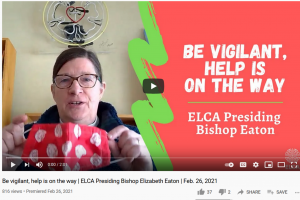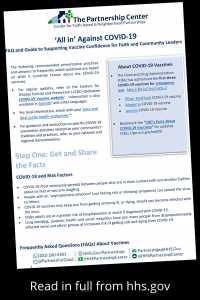Vaccination hopes, fears and falsehoods are around us in this time of heightened anxiety. A new resource, “‘All in’ Against COVID-19: FAQ and Guide to Supporting Vaccine Confidence for Faith and Community Leaders,” released March 1, 2021 by The Partnership Center, Center for Faith-based & Neighborhood Partnerships of the U.S. Department of Health and Human Services (HHS), was among those highlighted during a Faiths4Vaccines Roundtable Discussion in which ELCA advocacy staff participated.
 “Many people in this country do not trust either the government or the medical establishment. They fear that this might be an experiment or somehow the government intruding on this. I’ve even heard people say that they’re afraid that a chip is going to be inserted in their arm when they get the vaccine. That’s not true,” says Presiding Bishop Elizabeth Eaton in a Feb. 28 video. “The vaccine is safe, it’s effective, and it’s being made available to many, many, many people. So, I need you to talk to folks in your congregations… to convince them that this is safe, that it’s effective, and it will make it easier for us to return to life in person. …Be well, dear Church.”
“Many people in this country do not trust either the government or the medical establishment. They fear that this might be an experiment or somehow the government intruding on this. I’ve even heard people say that they’re afraid that a chip is going to be inserted in their arm when they get the vaccine. That’s not true,” says Presiding Bishop Elizabeth Eaton in a Feb. 28 video. “The vaccine is safe, it’s effective, and it’s being made available to many, many, many people. So, I need you to talk to folks in your congregations… to convince them that this is safe, that it’s effective, and it will make it easier for us to return to life in person. …Be well, dear Church.”
The FAQ section of “’All in’ Against COVID-19” is reproduced here, and it can be downloaded and reviewed in its entirety from HHS.gov, including annotated citations. The Partnership Center lists other resources for your review.
‘All in’ Against COVID-19: FAQ and Guide to Supporting Vaccine Confidence for Faith and Community Leaders
Step One: Get and Share the Facts
COVID-19 and Risk Factors
- COVID-19 most commonly spreads between people who are in close contact with one another (within about six feet or two arm lengths).
- People with an “asymptomatic infection” (not feeling sick or showing symptoms) can spread the virus to others.
- COVID-19 vaccines may keep you from getting seriously ill, or dying, should you become infected with the virus.
- Older adults are at a greater risk of hospitalization or death if diagnosed with COVID-19.
- Long-standing, systemic health and social inequities have put many people from disproportionately affected racial and ethnic groups at increased risk of getting sick and dying from COVID-19.
 Frequently Asked Questions (FAQs) About Vaccines
Frequently Asked Questions (FAQs) About Vaccines
Vaccines train our immune system to recognize the virus that causes COVID-19 and make cells to fight it. With vaccines, we can build immunity to a disease without getting the disease.
Herd immunity means that enough people in a community are protected from getting a disease because they’ve already had the disease or because they’ve been vaccinated. Herd immunity makes it hard for the disease to spread from person to person, and it even protects those who cannot be vaccinated, like newborns or people who are allergic to the vaccine.
Some people get temporary side effects like fever, headache, or a sore arm after they take the COVID-19 vaccine. Side effects are usually mild and last only a few days. Side effects occur when the body is building protection against the virus.
You cannot get COVID-19 from any of the COVID vaccines now in use nor from those being tested in the United States as none of them contain the live virus that causes the disease.
Clinical trials showed that the vaccines are 94-95 percent effective, meaning they prevent 94-95 of every 100 vaccinated individuals from getting COVID-19.
A vaccine reduces the likelihood that you will get infected, so you’ll be less likely to infect others.
A small number of people have had allergic reactions, called anaphylaxis, after getting a COVID-19 vaccine; but they were treated and have fully recovered. The CDC provides recommendations on what to do if you experience an allergic reaction after getting a COVID-19 vaccination or any other vaccine.
Scientists are studying variants of the virus that cause COVID-19 to see whether existing vaccines will protect people against them. You can track US COVID-19 cases caused by variants.
People of color who get COVID-19 are at much higher risk for severe cases of and even death from the disease. It’s important that they are vaccinated as soon as possible, especially seniors of color.
As larger supplies become available, more people will be able to receive the vaccines. Most adults should be able to get the vaccine later in 2021. Stay tuned to the vaccine program in your state/county by using the locator or through your state or local health department to find out when, where, and how vaccines will be available in your community.
Scientists are still reviewing this question. We don’t yet know how long natural antibodies in people who have had COVID-19, or antibodies created as a result of vaccines, will be effective.
We don’t know how long the vaccine protects people, but clinical trials are actively investigating this. What we do know is that among people who were vaccinated in clinical trials of the vaccines now available, 94 to 95 people out of 100 did not get the disease.
Vaccine doses purchased with U.S. taxpayer dollars and are being given to the American people at no cost. Vaccination providers can be reimbursed for vaccine administration fees by the patient’s public or private insurance company or, for uninsured patients. No one can be denied a vaccine if they are unable to pay a vaccine administration fee.
Yes! Experts need to understand more about the protection that COVID-19 vaccines provide in real-world conditions before they recommend that we stop wearing masks or avoiding close contact with others. In the meantime, it will be important for everyone to continue using all the tools available to help stop this pandemic.
-
- Wear a mask over your nose and mouth
- Stay at least six (6) feet away from others
- Avoid crowds
- Avoid poorly ventilated spaces
- Wash your hands often
Step Two: Get Vaccinated
There is a limited supply of COVID-19 vaccines currently available; however, the supply will continue to increase in the weeks and months ahead. It is expected that most of the American population will have access to the vaccine by fall 2021.
- When can I get a vaccine?
CDC makes recommendations for who should get the vaccine first, then each state makes its own plan of distribution. http://bit.ly/VaccFacts-5
- How much do I have to pay?
Vaccines are free to the public. http://bit.ly/VaccFacts-6
- Where can I get a vaccine?
Use the CDC’s vaccine locator or contact your state or local health department to find out when, where, and how vaccines will be available in your community. http://bit.ly/VaccFacts-7
